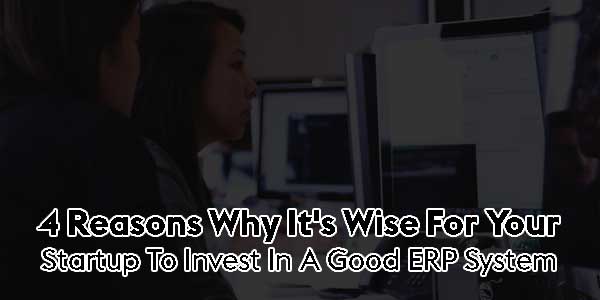
ERP is a business sector acronym that stands for “enterprise resource planning.” The goal of ERP software is to help businesses allocate resources for maximum efficiency, eliminate waste, and streamline production.
Data is the main driver of ERP technologies—access to and distribution of data, to be specific. More data flow, when managed properly, enables the integration of various aspects of a business that were previously separate. Here are four reasons why it’s wise for your startup to invest in a good ERP system.
Table of Contents
Cost Savings:
The most obvious benefit of ERP is the benefit to your company’s bottom line. The savings that ERP generates come in the form of optimized, automated business processes engineered by software to deliver maximum output using only essential resources.
The cost of ERP provider services, like Netsuite providers, compared to the cost savings of ERP for even small to medium-sized businesses, is negligible. It’s a simple matter of benefit-cost ratio, which ERP delivers in spades.
Streamlined Production:
Through a defined data structure, ERP facilitates communication and coordination between various departments. The name of the game here is “centralized data.” De-centralized, or “dumb” data, sits separately from other vast bodies of data. However, when that data is centralized and compared to data gathered by other departments, it could provide valuable insight into ways to optimize their respective performance. Ultimately, this could greatly benefit your company with reduced waste and more efficient operations.

Secure Supply Chain:
Besides streamline production, another benefit of ERP is securing your supply chain for smooth handling of materials from factory floor to final delivery. Throughout the manufacturing process for commercial vehicles, for example, information is critical to maintaining the proper flow of the build. Bits of data regarding parts, their sources, raw materials, supplier numbers, serial numbers, locations, quantities, and other information must all be managed. That’s where ERP shines.
Forecasting:
ERP enables a business to assimilate all of the information it gathers to make reliably accurate forecasts about the future. This trend will further accelerate as artificial intelligence (AI) is incorporated further into ERP technologies. Many ERP software developers already utilize AI in rudimentary forms, but as the technology advances exponentially, so will business management tools like ERP.
Moving into the future, we can expect ERP to become the standard. Computers are immensely powerful organizational tools, especially once AI is fully in the driver’s seat. If you want your business to remain competitive moving into the future, set your new business up with a good ERP from the start.

 About the Author:
About the Author:








![Word-Document-Won't-Open-In-The-Program-You-Expect-[SOLVED]](https://www.exeideas.com/wp-content/uploads/2020/07/Word-Document-Wont-Open-In-The-Program-You-Expect-SOLVED-300x150.jpg)







Well, I’d want to mention something concerning ERP users. They are often used by businesses to assist maintain track of all business processes. However, ERP may be used in a variety of industries, including healthcare, charitable organisations, construction, and hospitality, Supply Chain. As you mentioned, entrepreneurs must always be cautious while selecting ERP systems.
Welcome here and thanks for reading our article and sharing your view. This will be very helpful to us to let us motivate to provide you with more awesome and valuable content from a different mind. Thanks again.